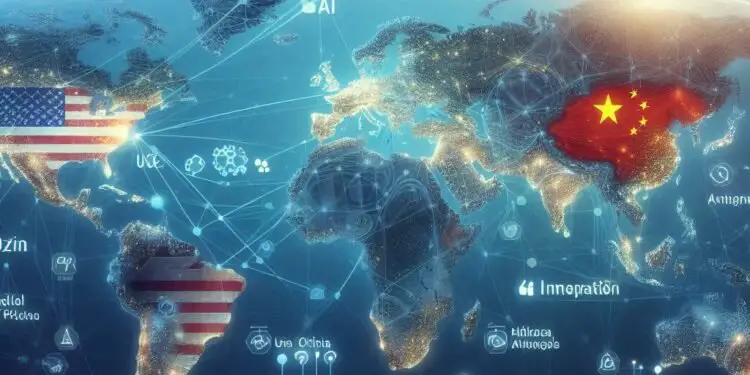Introduction
Artificial Intelligence (AI) is not just a futuristic concept—it is the center-piece of world technological competition. From self sufficient motors to language fashions and predictive analytics, AI is remodeling economies, industries, and even geopolitical strategy.
Today, nations and businesses alike are engaged in a high-stakes race for AI dominance. This competition is set more than simply innovation; it’s about securing monetary electricity, national protection, and technological sovereignty for many years to return.
In this newsletter, we’ll destroy down the important thing players in the global AI race, the stakes involved, and the way this opposition is shaping the destiny of labor, industry, and international relations.
Why AI Dominance Matters
The usa or business enterprise that leads in AI will possibly lead in:
- Economic productiveness
- Military generation
- Data control
- Healthcare innovation
- Consumer personalization
AI is a general-cause era—like power or the internet—that affects each region of the economic system.
🔍 Key Reasons AI Leadership Is Crucial:
- Massive financial value: Expected to feature over $15 trillion to worldwide GDP via 2030 (PwC).
- National safety: AI powers cyber-protection, surveillance, self sustaining weapons.
- Strategic influence: Leadership confers worldwide political and economic leverage.
Top Countries Competing for AI Supremacy
🇺🇸 United States: Innovation Powerhouse
The U.S. Stays the worldwide leader in AI studies and commercialization, in large part because of:
- Top AI research establishments (MIT, Stanford)
- Dominant tech companies (Google, Microsoft, OpenAI, NVIDIA)
- Access to top skills and assignment capital
- A strong startup ecosystem
Notable Achievements:
- GPT fashions by means of OpenAI
- AI-powered cloud offerings (AWS, Azure)
- Cutting-area chips by way of NVIDIA
The U.S. Is domestic to forty% of the arena’s pinnacle AI organizations and produces a huge proportion of excessive-effect AI studies papers.
🇨🇳 China: The State-Backed Challenger
China objectives to emerge as the sector leader in AI by using 2030, backed via big kingdom investment, national techniques, and get admission to to large records swimming pools.
Key Strengths:
- Government-pushed AI roadmap (AI 2030 Plan)
- Integration of AI into clever cities, schooling, and public services
- National champions like Baidu, Alibaba, Tencent, Huawei
Government Support:
- Billions in funding for AI startups
- Data get entry to through national surveillance infrastructure
- Mandated AI training in faculties
China’s centralized model allows rapid deployment and scale, though on the cost of privateness and openness.
🇪🇺 European Union: The Ethical Regulator
Europe lags in AI scale however leads in law, ethical frameworks, and privacy.
Focus Areas:
- Creating a honest AI surroundings
- Promoting human-centric AI
- Enforcing GDPR and the AI Act
Weaknesses:
- Fewer huge tech firms
- Risk-averse challenge capital
- Fragmented innovation across member states
Still, Europe is shaping worldwide requirements for AI governance.
Corporate Giants Leading the AI Charge
🧠 United States
- Google DeepMind and Google AI: Known for AlphaGo, Gemini fashions, AI Search.
- Microsoft: Major investor in OpenAI; integrates AI into Office and Azure.
- Amazon: Uses AI across Alexa, logistics, and AWS offerings.
- Meta (Facebook): Advances in AI-generated content and open-supply models.
⚙️ China
- Baidu: China’s AI search chief and self reliant using innovator.
- Alibaba DAMO Academy: AI-powered e-commerce and logistics.
- Tencent: Focus on AI for games, healthcare, and fintech.
- Huawei: AI hardware, chips, and 5G infrastructure.
These groups now not best build AI equipment, but also shape how people engage with AI daily.
AI Applications Driving Economic Growth
AI is not restricted to labs—its real-world applications are expanding rapidly throughout sectors:
💼 Business & Enterprise
- AI-powered analytics
- Automated customer service (chatbots, virtual retailers)
- Predictive protection in production
🏥 Healthcare
- AI diagnostics (X-ray and MRI evaluation)
- Drug discovery and genomics
- Personalized medicine
🚗 Transportation
- Autonomous motors (Tesla, Waymo, Baidu)
- AI logistics and direction optimization
- Drone delivery structures
📱 Consumer Tech
- Voice assistants (Siri, Alexa, Google Assistant)
- Recommendation engines (Netflix, YouTube, TikTok)
- Image and speech popularity
By 2030, AI should automate 30% of obligations in lots of industries, improving productiveness and growing new enterprise fashions.
AI Talent and the Global Brain Drain
The race for AI dominance is also a race for top-tier talent — engineers, records scientists, and AI researchers.
Key Trends:
- The U.S. Attracts top global expertise thru universities and H1-B visas.
- China is building home expertise pipelines through competitive education reform.
- Europe faces mind drain to Silicon Valley and Beijing.
The scarcity of elite AI expertise has driven salaries sky-high, with a few researchers incomes over $500,000 yearly.
AI Regulation and Ethics: A New Front
As AI becomes extra powerful, requires law grow louder.
🧩 Key Issues:
- Bias in AI algorithms
- Data privacy and surveillance
- Job displacement
- Misuse of AI in incorrect information or warfare
Regulatory Approaches:
- U.S.: Sector-precise, marketplace-driven oversight
- China: State-controlled deployment
- EU: Comprehensive, threat-primarily based law (AI Act)
The stability among innovation and protection will outline the following phase of AI development.
AI and Geopolitics: The New Arms Race
🔐 Military Implications:
- Autonomous weapons
- AI-powered intelligence gathering
- Cyber protection and offense
🛰️ Strategic Technologies:
- Semiconductor manufacturing (U.S.-China chip wars)
- Quantum AI studies
- AI in space and satellite tv for pc systems
Control over AI additionally method manage over records flows, digital infrastructure, and future conflict.
Challenges to Global AI Collaboration
While AI has potential for international advantage—curing illnesses, tackling climate alternate, and optimizing sources—opposition might also restrict collaboration.
Roadblocks:
- Nationalism and protectionism
- Data localization laws
- IP and safety issues
- AI used as a diplomatic tool
Yet, establishments just like the UN, OECD, and G7 are working to construct frameworks for worldwide AI governance.
The Future of AI Dominance
No single kingdom or enterprise may dominate AI forever. Instead, the destiny can be multipolar, with distinctive areas main in one-of-a-kind elements:
- The U.S. In innovation and commercialization
- China in deployment and scaling
- Europe in ethics and governance
AI will stay a strategic battleground, but additionally a pressure for monetary progress and human development—if harnessed responsibly.
Conclusion
The race for AI dominance is about extra than bragging rights. It’s approximately reshaping monetary strength, country wide identification, and human ability within the digital age. While the U.S., China, and Europe sprint in advance, the rest of the sector must determine how to participate, alter, and benefit from this technological revolution.
In the cease, folks that lead in AI will form the rules of the destiny — from how we paintings to how we salary battle, and even how we define intelligence itself.
🔑 Key Takeaways:
- The worldwide race for AI dominance involves governments, businesses, and researchers.
- The U.S. And China are frontrunners, at the same time as the EU makes a speciality of regulation.
- AI management gives economic, military, and geopolitical benefits.
- Ethical concerns and talent shortages are predominant demanding situations.
- Global cooperation is vital, however tough to attain amid growing opposition.













